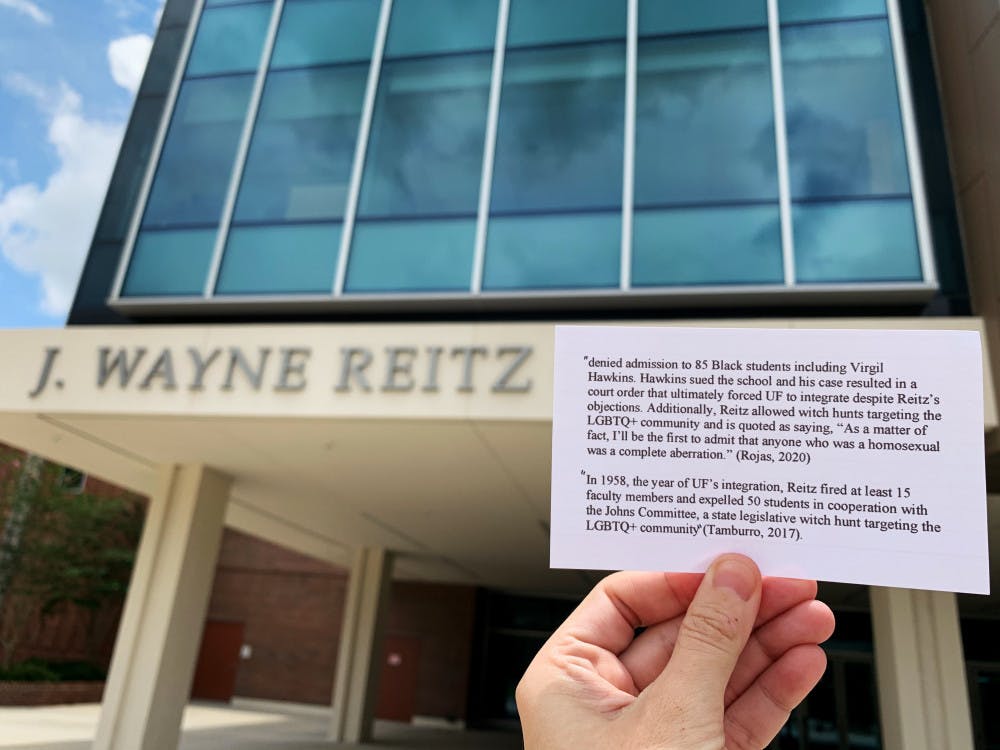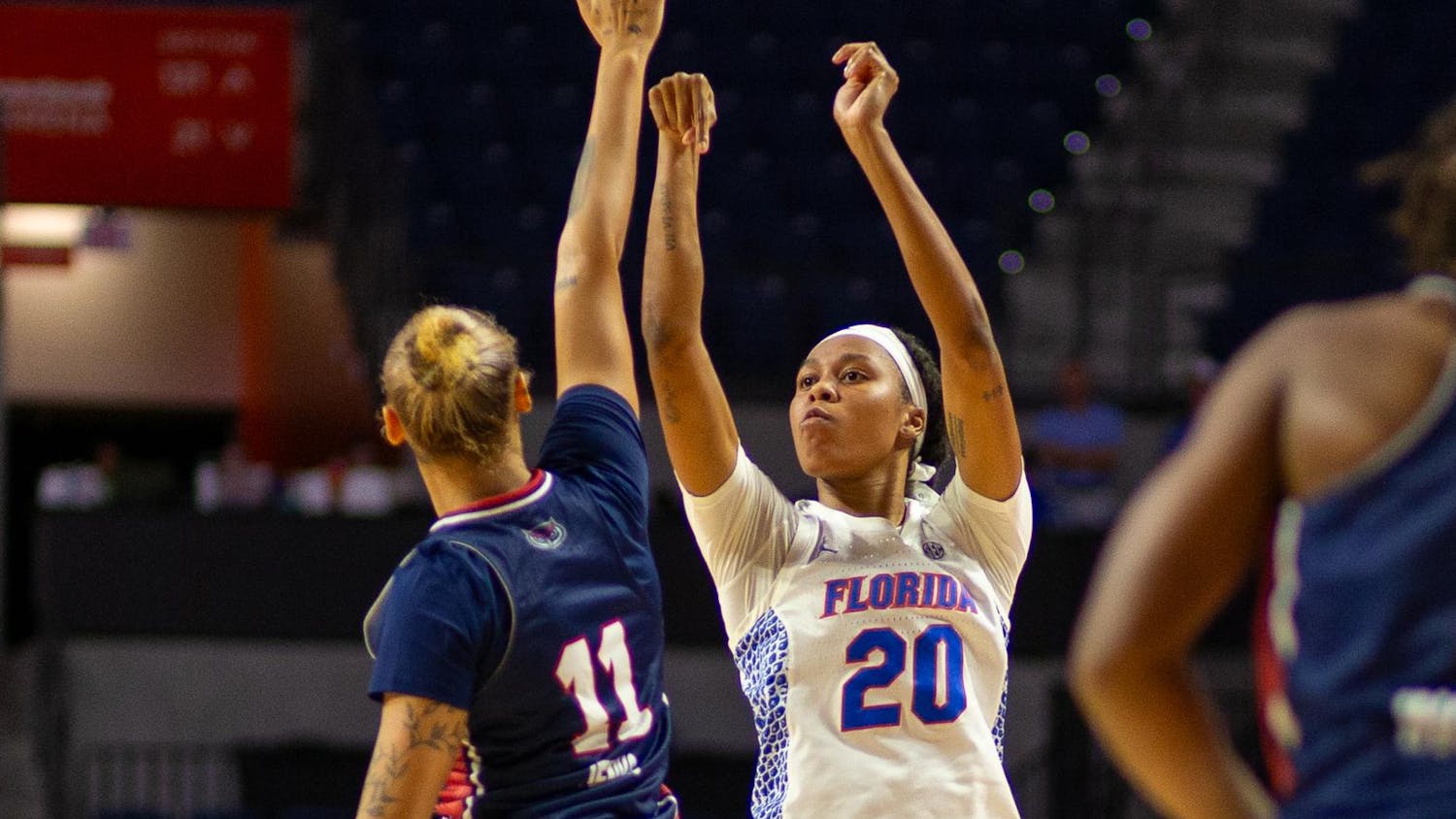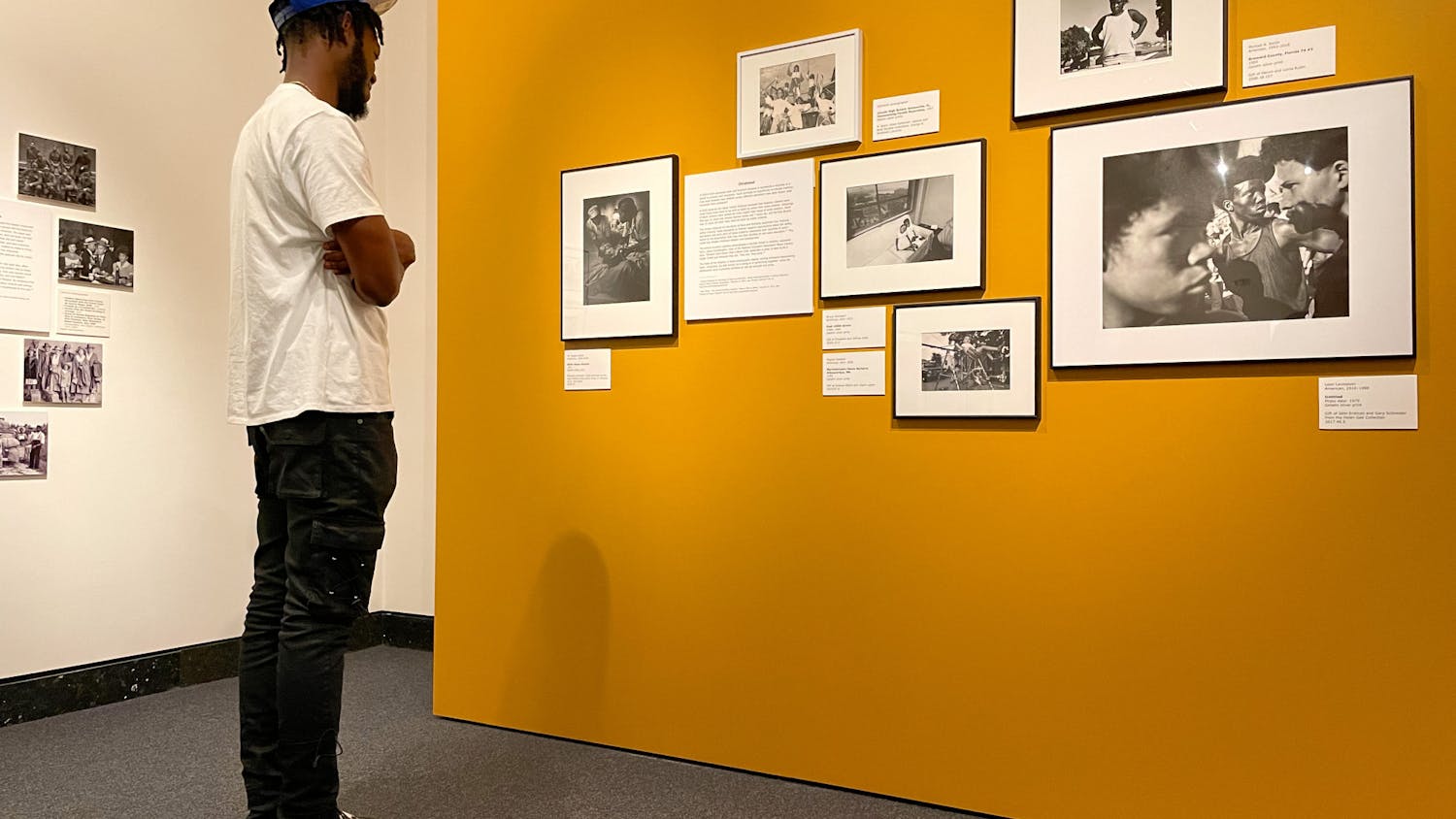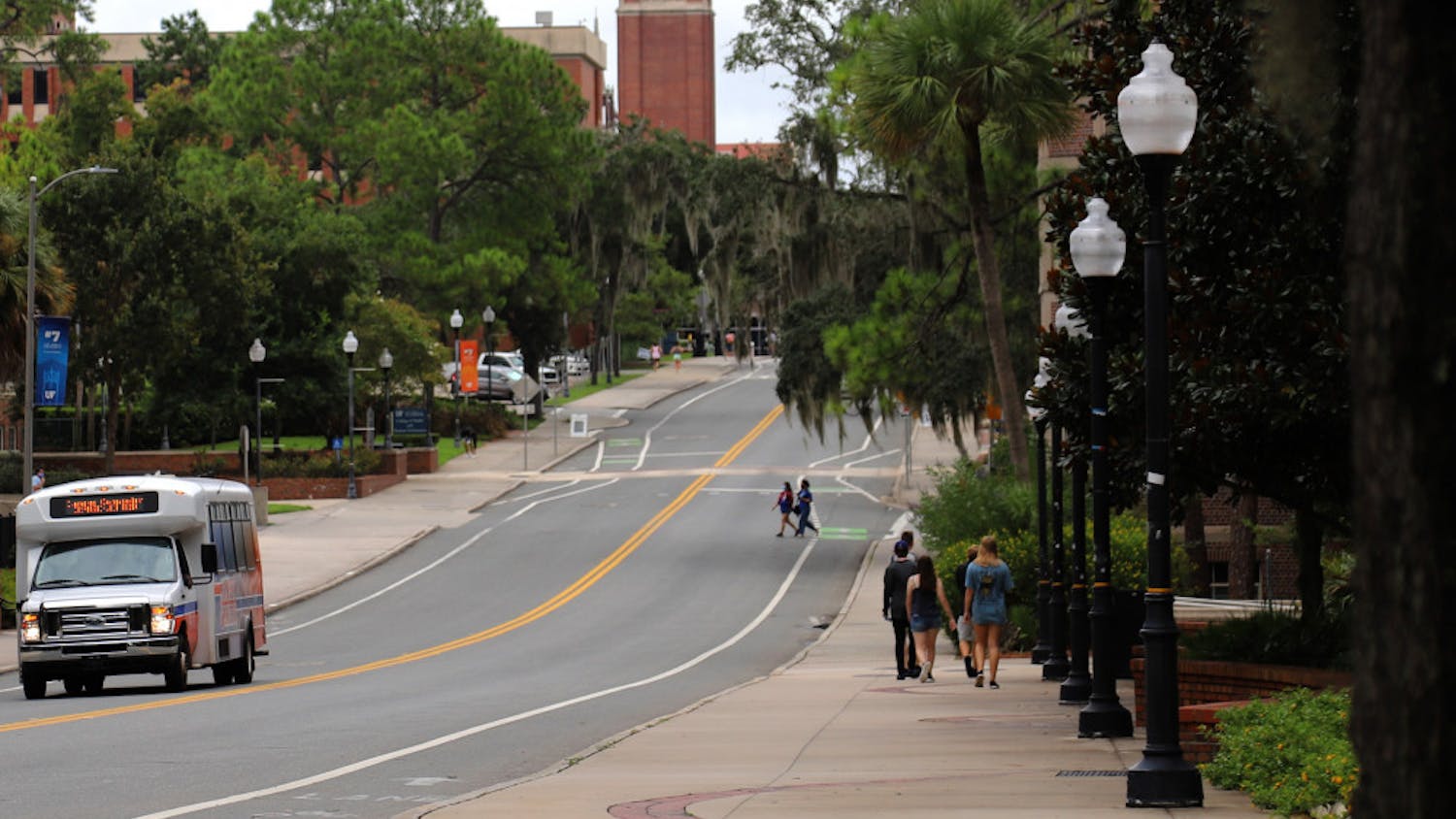Bree Turner gets a bitter taste in her mouth when she walks into the Reitz Union. Students walk in and visit with their friends at the food court, prepare for a club meeting or play a round of ping-pong—oblivious to her discomfort.
When she walks through those glass doors, she thinks of the building’s namesake, J. Wayne Reitz: a former UF president accused of racism.
Amid Black Lives Matter protests and public outrage about institutional racism, Turner and thousands of UF students and faculty have signed petitions calling for UF to remove the names of figures with racist pasts like Stephen C. O’Connell and Reitz from buildings on campus.
Turner, a 21-year-old UF political science and theater senior, said the figureheads should not be memorialized on campus. As a Black student, she said it’s frustrating to watch these names persist despite years of requests for them to be taken down.
In an article from the Florida Historical Society, Reitz is characterized as a “practical segregationist” who sought to keep Black enrollment down at UF. Reitz also allowed the Johns Committee, a Florida legislative investigation committee named after Senator Charley Johns, to target gay people in the 1950s and 60s, resulting in 15 UF professors and more than 50 students leaving UF, according to the UF Smathers Libraries website.
Calls to rename the Reitz have echoed around campus for years, including in a 2019 Student Government referendum, or question on a student government ballot, which asked students if they wanted to change the namesake to honor Virgil D. Hawkins, a civil rights activist who helped Black people gain access to higher education in Florida in the 1940s and ’50s. Hawkins also helped desegregate the UF Levin College of Law and the university’s graduate and professional schools.
SG never voted on it because the deadline for the referendum passed due to a cancelled meeting.
A similar one appeared on SG ballots even earlier in 2012. A total of 1,764 students voted to rename the building after Virgil D. Hawkins, but 5,469 students voted against the name change, and it was not approved.
Anthony Rojas, a 24-year-old UF political science master’s student, created a petition June 5 asking the UF administration to rename the Stephen C. O’Connell Center, J. Wayne Reitz Student Union and six other UF buildings on campus whose namesakes were racist or homophobic. As of Friday evening, the petition had more than 6,900 signatures.
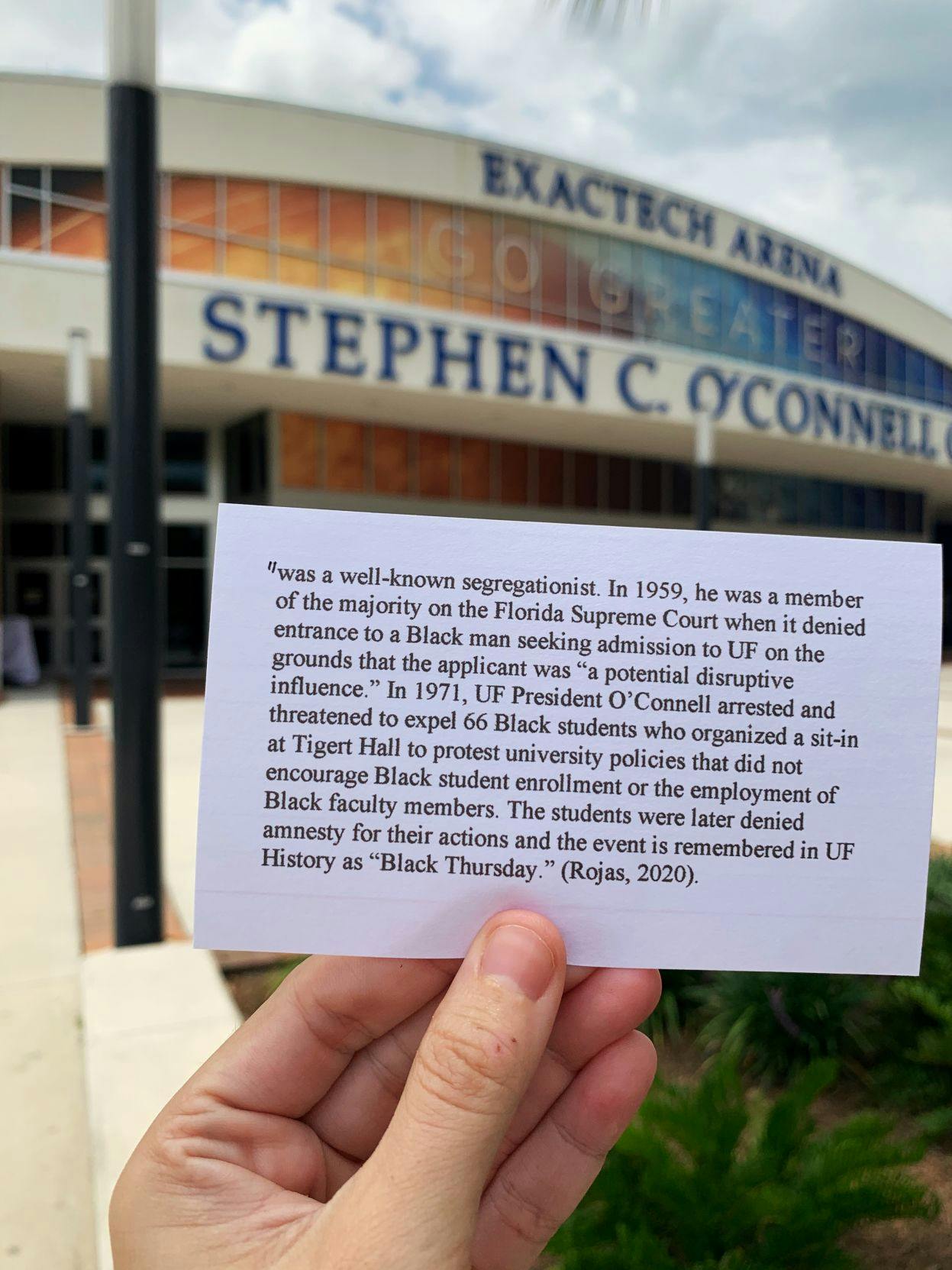
Shelby Boehm, a 28-year-old UF English education Ph.D. student, holds up a piece of paper highlighting Stephen C O'Connell's controversial history with the O'Connell Center's sign visible in the background.
“Either you support your Black community, or you support the legacy of individuals who are racist and who demeaned Black students,” he said. “There is no in between here.”
If UF wants to truly condemn incidents of racism, the university cannot continue to honor racists with these buildings, Rojas said. He said he is tired of wondering why no action has been taken and hopes UF listens to the pleads of their students.
“For me and for many others, patience ran out when you saw the video of what happened to George Floyd,” he said.
A similar petition, created by 20-year-old UF political science junior Madison Gore, had more than 4,100 signatures.
Gore took Florida Since 1845, a class at UF where she learned that many of the university buildings’ namesakes, including John Wayne Reitz of the Reitz Student Union, discriminated against and targeted LGBTQ+ and Black students, she said.
She said it is a victory that the university has committed to reviewing the names of these buildings, but hopes that all racist names are put into question, not just ones that celebrated the Confederacy, which include Yulee, Reid and Mallory Halls.
The Reitz Union houses the university’s food court, the UF SG office and hosts many university events. It is also home to the UF Multicultural and Diversity Affairs office—where the Black Affairs and LGBTQ+ Affairs offices are located.
Gore said the prominence of the building makes it even more disappointing to learn the history behind the name, because it is meant to be a place to unite students.
“You should want to be at a place named after someone who is important for being a good person, for fighting for what is right,” she said. “Not for someone who denies people because of their race.”
Gore’s instructor, UF professor Steven Noll, has taught Florida Since 1845 for more than 15 years. He said students are constantly surprised by the university’s history in homophobia and racism, such as the discrimination against Hawkins.
UF presidents have spoken on the issue of racism on campus in the past, but no president has made a call to action like President Fuchs has, according to Noll.
UF President Kent Fuchs sent an email to all UF students on June 18 announcing a list of initiatives to address racism and inequity on campus, including ending the use of prison labor in university agricultural operations and removing the “Gator Bait” chant from use by Gator Band and UF athletic events.
In the message, Fuchs wrote he is “personally committed to removing any monuments or namings that UF can control that celebrate the Confederacy or its leaders.”
“Doing nothing, at some level, makes you complicit in the way things are now,” Noll said.
This is not the first time students have called for the campus to address racism.
Rojas sat in disbelief as his Black peers were shoved off-stage during a commencement ceremony in 2018. At the time, students complained that the incident was related to race. In response to the incident, the university placed the university official on paid administrative leave. UF President Kent Fuchs called the actions “inappropriately aggressive,” and later announced the university would reform commencement ceremonies.
After the incident, Rojas worked with the UF Black Student Union and Black Leadership Council, a collective of leaders from Black organizations on campus, to create a list of demands. The list of demands was sent to President Fuchs and included a call to rename certain UF buildings, he said.
In a conversation with UF’s Chief Diversity Officer, Antonio Farias, the group said they were concerned about the way UF treats their Black students, Rojas said, and Farias reassured them that the university would create a plan to tackle those issues.
Dr. Patricia Hilliard-Nunn, a senior lecturer of African American studies, said she believes the university has the resources to change the names on these controversial buildings. But the university holds back from changing names because of the money people donate to the school in those people’s names, she said.
Other universities across the nation, like Princeton University and Louisiana State University, are working to remove names of racist figures from their campuses.
Turner said the issue is not about completely erasing the racist and homophobic history from these names, but about holding UF accountable for the figures its buildings are named after and how their histories might affect students.
“Walking into these spaces and knowing the history behind them, it leaves you with a bitter taste in your mouth because everyone wants to feel like they belong,’ she said. “We are all Gators.


